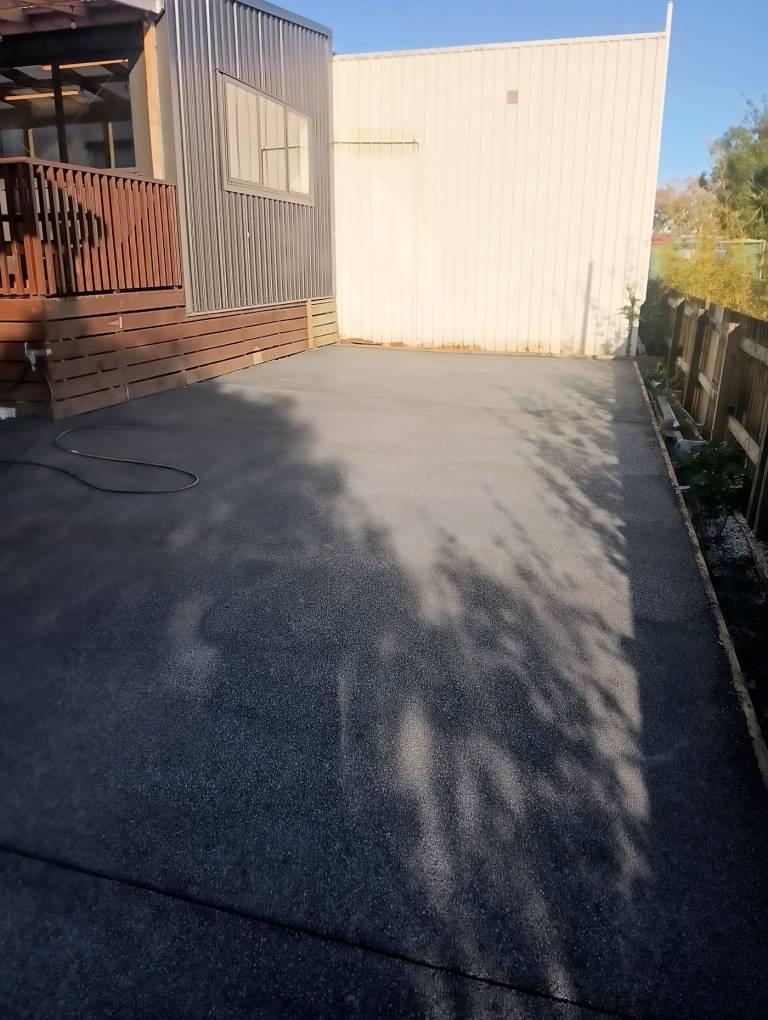Permeable Concrete Services Hamilton
Permeable concrete technology offers an ideal solution for managing surface water in areas with little to no fall, reducing the need for additional drainage systems by up to two-thirds — saving you money. Permeable concrete also allows water to return directly to the ground’s water table rather than being redirected elsewhere, promoting sustainable drainage for Hamilton properties.
What is Permeable Concrete?
Permeable concrete, also referred to as pervious or no-fines concrete, is a specialised form of concrete engineered to facilitate the passage of water through its structure. This characteristic is crucial in minimising surface runoff, replenishing groundwater supplies, and mitigating the risks of flooding and water contamination.
Key Features of Permeable Concrete:
Composition
Permeable concrete is crafted from a blend of coarse aggregates, cement, and water, with little to no inclusion of sand. The absence of fine particles results in a porous, open-cell structure, which is essential for its ability to allow water to permeate through.
Strength
To improve the structural integrity of permeable concrete, a thin layer of cement paste is applied. This technique ensures the material maintains its durability while still fulfilling its primary function of water permeability.
Maintenance
Regular maintenance is vital to ensure permeable concrete remains effective. This includes periodic inspections and cleaning, which can be accomplished through light pressure washing or suction cleaning to remove any debris that could obstruct the pores.
Design Considerations
Designing with permeable concrete requires careful calculation of water content. If the water content is too high, the pores may become clogged, compromising the material’s permeability. Conversely, too little water can make the concrete difficult to work with and reduce its effectiveness.
This combination of innovative design and thoughtful maintenance makes permeable concrete an excellent choice for sustainable construction projects aimed at reducing environmental impact.

How does permeable concrete work?
Permeable concrete, also known as pervious concrete, works by allowing water to pass directly through its structure, thanks to its unique composition.
Unlike traditional concrete, it is made with little to no fine aggregates, which creates a network of interconnected voids that account for 15-25% of its volume. These voids enable water to flow through at a rapid rate, often around 3 to 8 gallons per minute per square foot. This permeability helps in reducing surface runoff, recharging groundwater, and filtering pollutants as water percolates through the material. The open-cell structure also prevents the formation of standing water, making surfaces safer and more sustainable in managing stormwater.
Applications of Permeable Concrete:
Permeable concrete is widely used in both residential and commercial settings due to its ability to manage stormwater effectively. Common applications include:
- Driveways
- Pavements, walkways & patios
- Car parks & road strips
- Public spaces
Features & Benefits of Permeable Concrete:
- Stormwater Management
- Groundwater Recharge
- Reduced Urban Heat Island Effect
- Improved Water Quality
- Sustainability
- Visually Appealing – improves the overall aesthetic look.
- Ensures retention for up to 90 minutes.
Factors Affecting Permeability of Concrete
Permeability in concrete is influenced by several critical factors:
- Water-Cement Ratio: A higher water-cement ratio increases the porosity of concrete, leading to higher permeability.
- Aggregate Quality: The type, size, and porosity of aggregates used in the mix play a significant role. High-quality, well-graded aggregates reduce permeability by minimising void spaces.
- Curing Process: Adequate curing improves the hydration of cement, reducing the number of capillary pores and thus decreasing permeability.
- Degree of Compaction: Proper compaction eliminates air voids, ensuring a denser and less permeable concrete structure.
- Concrete Age: Over time, the ongoing hydration process continues to reduce permeability as the concrete matures and hardens.
Understanding and controlling these factors is essential for producing durable, low-permeability concrete suitable for water-resistant and structural applications.
Areas We Provide Permeable Solutions:
At Rock Solid Worx, we specialise in providing high-quality permeable concrete solutions tailored for both residential and commercial applications. Whether you’re looking to improve your driveway, patio, or parking area, our expertise ensures that your project will manage stormwater effectively while maintaining durability and aesthetic appeal.
We proudly serve a wide range of local communities, including:
- Waikato
- Hamilton
- Huntly
- Te Kauwhata
- Morrinsville
- Raglan
- Cambridge
- Matamata
- Ngaruawahia
frequently asked questions
Permeable concrete has a distinctive, open-textured surface with visible aggregates, giving it a rough, unfinished appearance. The lack of fine particles, such as sand, creates voids within the concrete, allowing water to pass through. This porous structure is both functional and aesthetically suitable for various applications.
Permeable concrete block paving consists of specially designed interlocking blocks that create gaps between them, allowing rainwater to seep through the surface and into the ground below. This design helps manage stormwater runoff and can be used in driveways, walkways, and parking lots.
Yes, permeable paving is generally more expensive than traditional concrete due to the specialised materials and installation techniques required.
Permeable concrete is highly effective in reducing surface runoff, recharging groundwater, and preventing flooding. Its porous structure allows water to pass directly through, reducing the strain on drainage systems and mitigating erosion. When installed correctly, it offers both environmental and practical benefits.
Permeable concrete can last as long as traditional concrete—typically 20 to 40 years—when properly maintained. Regular cleaning to prevent clogging and periodic inspections are essential to maximise its longevity and performance. Its durability makes it a cost-effective solution over time.

